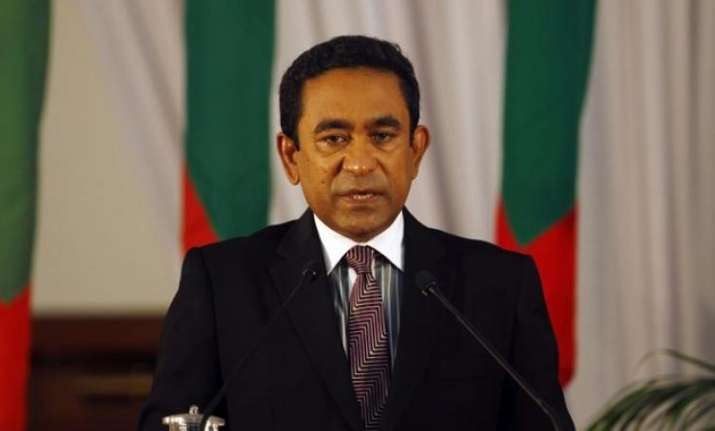Amid political turmoil, Maldives Parliament extends emergency for 30 more days
President Yameen declared emergency on February 5 after the Supreme Court ordered the release of a group of Opposition leaders, who had been convicted in widely criticised trials.
The Maldives’ Parliament today extended the state of emergency by another 30 days, approving President Abdulla Yameen’s recommendation, bolstering his grip on power in the troubled Indian Ocean island nation.
President Yameen declared emergency on February 5 after the Supreme Court ordered the release of a group of Opposition leaders, who had been convicted in widely criticised trials. Among them was exiled ex-President Mohamed Nasheed. The court said his 2015 trial had been unconstitutional.
Only 38 MPs were present for the vote, which took place hours before the state of emergency was due to expire, despite 43 lawmakers being needed for the vote to take place as required by the Constitution, Maldives Independent news website reported.
All 38 were from the ruling Progressive Party of Maldives and they all approved the extension, it said.
The opposition boycotted the vote.
The state of emergency will now end on March 22.
Parliament Speaker Abdulla Maseeh quoted parliamentary regulations which do not include state of emergency declarations among the votes where a constitutionally required quorum is needed.
“There is no other law that requires compliance by citizens to the extent a state of emergency requires compliance. We are asking citizens, we are compelling them to let the state suspend and restrict their fundamental rights for more than a month. There is no other violation of the constitution that shines on this clearly,” said opposition MP Ibrahim Mohamed Solih.
Eva Abdulla, another opposition lawmaker, accused the speaker of bypassing the constitution and said the state of emergency was illegal.
Shahindha Ismail, executive director of the Maldives Democracy Network, said the ruling party has effectively and completely removed all democratic and lawful systems of governance in this country.
The controversial vote took place at the second extraordinary session in as many days.
Under the emergency law, Yameen had two Supreme Court judges arrested, accusing them of corruption. Later, the remaining three judges annulled the order to release Yameen’s opponents.
There has been international condemnation of the government’s moves, with the US and India expressing concern.
Meanwhile, India today said it expects that in Maldives there will by no extension of emergency upon its expiry, asserting that it was important that the island nation quickly returns to the path of democracy and the rule of law.
“It is our expectation that the Government of Maldives will not be seeking extension of the State of Emergency so that the political process in Maldives can resume with immediate effect,” the external affairs ministry said in a statement in New Delhi.
In another development, the Maldivian government today assured the European Union (EU) it will uphold the rule of law in the country.
Minister of Foreign Affairs Mohamed Asim met with EU Ambassador to Maldives Tung-Lai Margue to discuss the Maldivian political situation, according to a media report.
The minister said that upholding the rule of law was the Maldivian government’s biggest priority.
The declaration of emergency in Maldives has been criticised by the EU. It has appealed to the Maldivian government to ensure freedom of speech is protected, and ensure the police and military conduct their operations with minimum impact to the public.







No comments:
Post a Comment